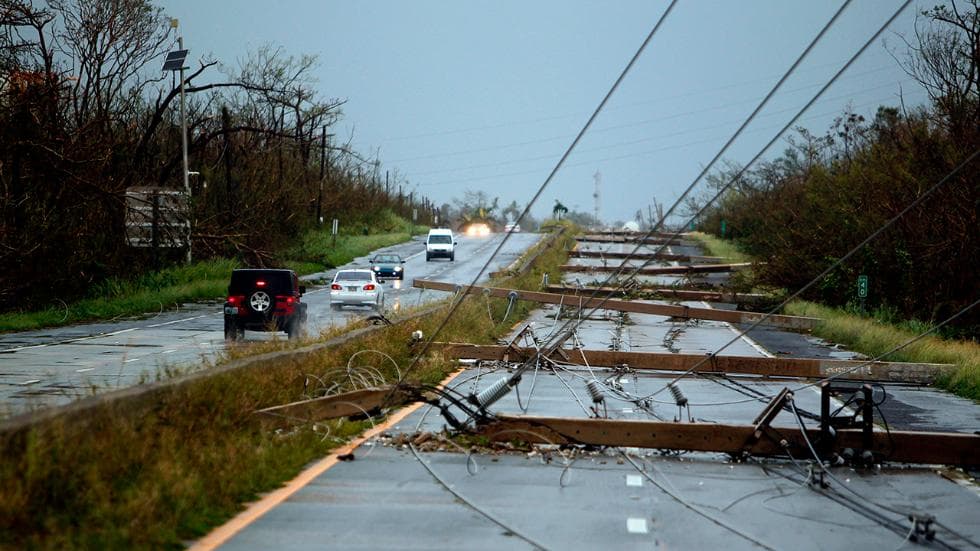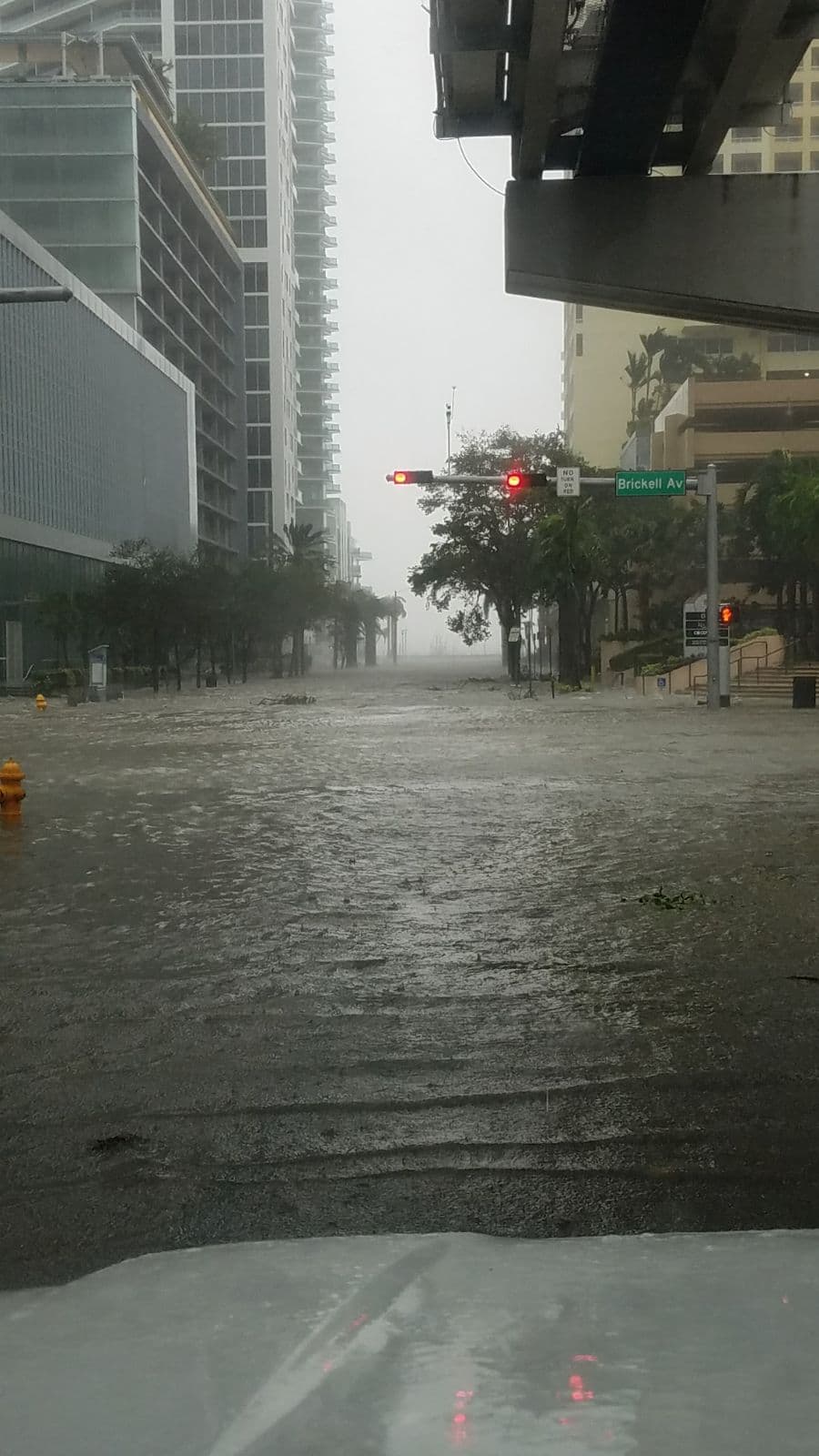The coming storm: Are these 'temporary' immigrants Trump's next target?
In November, the Department of Homeland Security has to decide whether to extend Temporary Protected Status, or TPS, for some 59,000 Central Americans who received the status 18 years ago, after a powerful hurricane devastated their countries.
MIAMI, Florida – Nearly two weeks after Hurricane Irma hit South Florida, Olga Herrera is still in the dark. Power lines are down, and trees scatter her yard.
And yet she knows she got lucky. Almost 20 years ago, another hurricane nearly washed away her entire house.
On October 29, 1998, Hurricane Mitch arrived to Honduras and parts of Nicaragua. Over five days, the storm’s rains and mudslides buried homes and people. In Olancho, Honduras, one of the areas hardest hit, the winds took Herrera’s roof and most of her walls.
By the time it ended, thousands of people across Central America were dead, and thousands more disappeared.
“I have memories of families, complete families, drowning in the river – of kids dying,” says Herrera, 40, a mother-of-three. “There was so much destruction.”
In the aftermath, Herrera migrated to the U.S. to join her mother and sister. A few months later, the government of then President Bill Clinton granted Temporary Protected Status, or TPS, to people who could not return to Honduras and Nicaragua due to the devastation wrought by Mitch. Under the immigration status, which is granted due to conflict, natural disaster or other extraordinary conditions, those with TPS can temporarily live and work legally in the United States and be protected from deportation.
But the designation for both countries comes up for renewal January 5. Sixty days prior, in November, the Department of Homeland Security has to decide whether to extend or terminate the benefit.
That has beneficiaries worried. After the U.S. Department of Homeland Security told 46,000 Haitians in late May that they should prepare to return home when their TPS expires in January, tens of thousands of Hondurans and Nicaraguans now fear the same fate.
A total of 57,000 Hondurans and 2,550 Nicaraguans currently hold TPS, according to the United States Citizenship and Immigration Services.
Francisco Portillo, a political activist who runs the Organizacion Hondureña Francisco Morazan, says his organization is preparing for the worst.
“If Trump took TPS away from the Haitians, if he’s ending DACA, why would he extend it for Honduras?” Portillo says. “It’s sad, these are people who have been here working and building a life for 20 years.”
Devastation in Central America
Hurricane Mitch was a remarkable storm. A Category 5 hurricane over the Caribbean late in the season, it entered from the north into Honduras and weakened upon landfall. But the rains lingered over the mountainous terrain, dumping unprecedented amounts of water that produced flooding and mudslides. In some areas, there were reports of 75 inches of rain, according to the National Oceanic and Atmospheric Administration. (In August, Hurricane Harvey dropped 50 inches in parts of Texas.)
By the time it was over, Mitch was the second deadliest hurricane in recorded history. It devastated Honduras, leaving in its wake some 6,000 fatalities, 8,000 disappeared and a potentially one million homeless in the country. Entire villages were washed away, and an estimated 70 percent of the country’s transportation infrastructure was destroyed, including bridges and airports. Some 70 percent of crops were ruined.

In Nicaragua, 3,800 were killed with another 7,000 disappeared and some 800,000 homeless.
The President of Honduras, Carlos Flores Facusse, claimed the storm set the country back 50 years.
When the rains stopped, Herrera, who was 20 at the time, saw her village completely destroyed. Hospitals and schools were leveled, and bridges had disappeared into the mud. She decided to leave, alone. First, she says she swam across the river and then traveled by bus to the capital Tegucigalpa. She crossed Guatemala and México and finally made it to Texas in late 1998.
Temporary Protected Status
Honduras and Nicaragua were designated as TPS countries on January 5, 1999, by Attorney General Janet Reno. Only those who were in the country at the time of designation were eligible.
Edis Zelaya had crossed the border in April 1998, seeking better work opportunities. After Hurricane Mitch, he applied for TPS and began sending money back to his family in Honduras. He’s since built a life in the United States, and his children are U.S. citizens.
“My family was affected, they lost their home… nearly half of my family member’s houses were lost,” says Zelaya, who works in construction.
Since 1999, Hondurans and Nicaraguans with TPS have started businesses and bought homes. They pay taxes and contribute to social security. Some have been able to establish permanent residency, such as through family members.
Since the initial designation, the United States has renewed the statute every 18 months, allowing those with the original TPS benefit to renew their work permits.
But things are different now, Portillo says.
“When Trump didn’t renew Haiti’s TPS, Hondurans started getting nervous and selling their homes,” he says. “They felt the same thing was going to happen to them.”
Daniella Burgi-Palomino, a senior associate at the Washington-based Latin America Working Group, which is lobbying U.S. lawmakers for a TPS extension, says both DACA and TPS are examples of how the current administration seems to believe “six months is enough for people to uproot and figure out the next step in their life.”
“And you’re talking about implementing all these anti-immigrant actions among populations affected by other crises, such as the storms in Texas and Florida,” she says. “It all fits in with the government’s anti-immigrant vision.”
The Latin America Working Group is trying to gather support from congressional offices to pressure the Department of Homeland Security, which needs to make the decision on the extension of TPS. As part of that, they’re highlighting the ongoing violence in much of Central America.
Honduras is one of the poorest countries in Latin America, with more than 66 percent of the population living in poverty in 2016. It has one of the highest murder rates in the world, at 59 murders per 100,000 inhabitants in 2016, according to the Observatory of Violence at the National Autonomous University of Honduras.

In addition to Honduras and Nicaragua, El Salvador was given TPS designation in 2001 after a series of earthquakes. There are approximately 200,000 Salvadorans who hold TPS. The designation is set to expire for that country March 9.
Burgi-Palomino says the decision on the future of TPS for the three Central American countries may be announced at the same time.
Longtime immigration activist Nora Sandigo says Hondurans and Nicaraguans have never felt their immigration status so at risk.
“After many years here, they’ve built careers, businesses, homes, they have important positions in their jobs,” Sandigo says. “It’s very difficult to face an exit after so many years with such stability.”
Sandigo says she assumed those in the United States for decades would eventually be legalized.
“They renewed it and renewed it and 20 years later these people have families,” she says. “And now they tell them to leave? Where are they supposed to go?”
A Dangerous Return
Immigrant advocates say those sent back to Honduras and El Salvador, especially, would be exposed to horrific gang violence. That violence, coupled with economic desperation, has been the cause of unprecedented levels of Central American migration in recent years, even as U.S. border security has tightened.
Zelaya says he doesn’t envision a life back in Honduras after 19 years in the United States. Last year, one of his brothers was killed by gang members after a car-jacking.
“I have a life made here,” he says. “I can’t imagine going back.”
People with TPS don’t receive public benefits. They must complete background checks when they submit renewal applications.
On September 11, 116 members of Congress signed a letter to President Trump asking to renew TPS for Honduras and El Salvador.
“Unfortunately, conditions have not sufficiently improved since the most recent extension,” the letter reads. “Additionally, El Salvador and Honduras are ranked as among the most violent countries in the world, and job opportunities are scare. These factors complicate the ability of Honduras and El Salvador to fully recover from the natural disasters that resulted in their original designation.”
Just three of the signers were Republicans: Congressman Randy Hultgren (R-IL), Mike Coffman (R-CO) and Carlos Curbelo (R-FL).
For Herrera, whose husband also has TPS, worries about the future of her immigration status have coincided with the stress of Hurricane Irma’s destruction. Though it was so long ago, Hurricane Mitch, she says, is still a vivid memory.
“When I hear that a hurricane is coming I get terrified,” she says. "With Irma, I went crazy. I was totally stressed. I remember those kids drowning. You don’t forget that.”













































